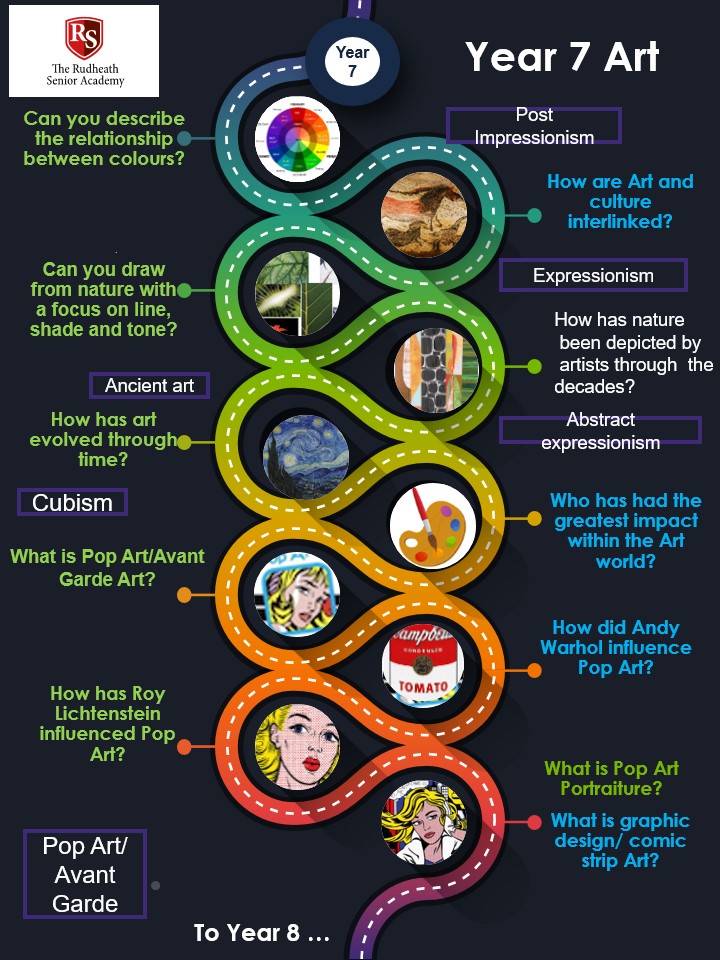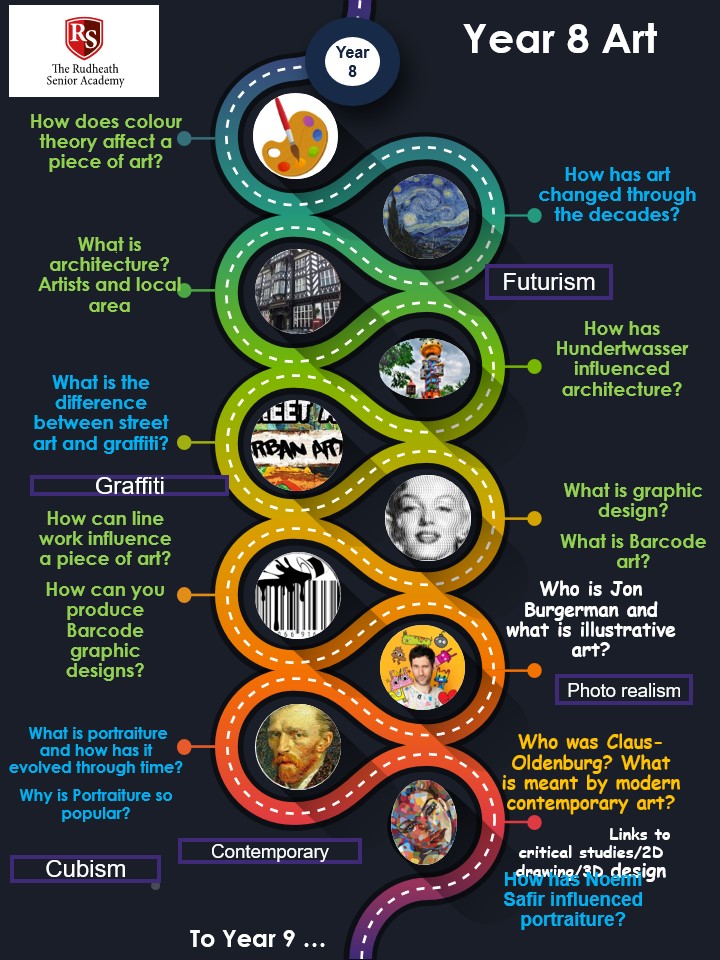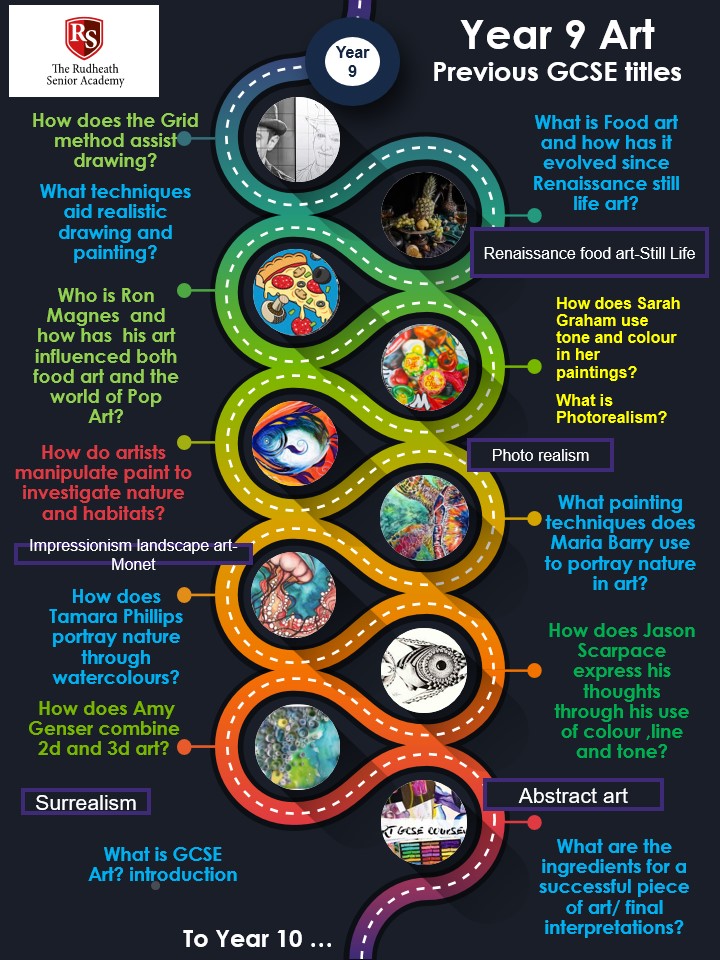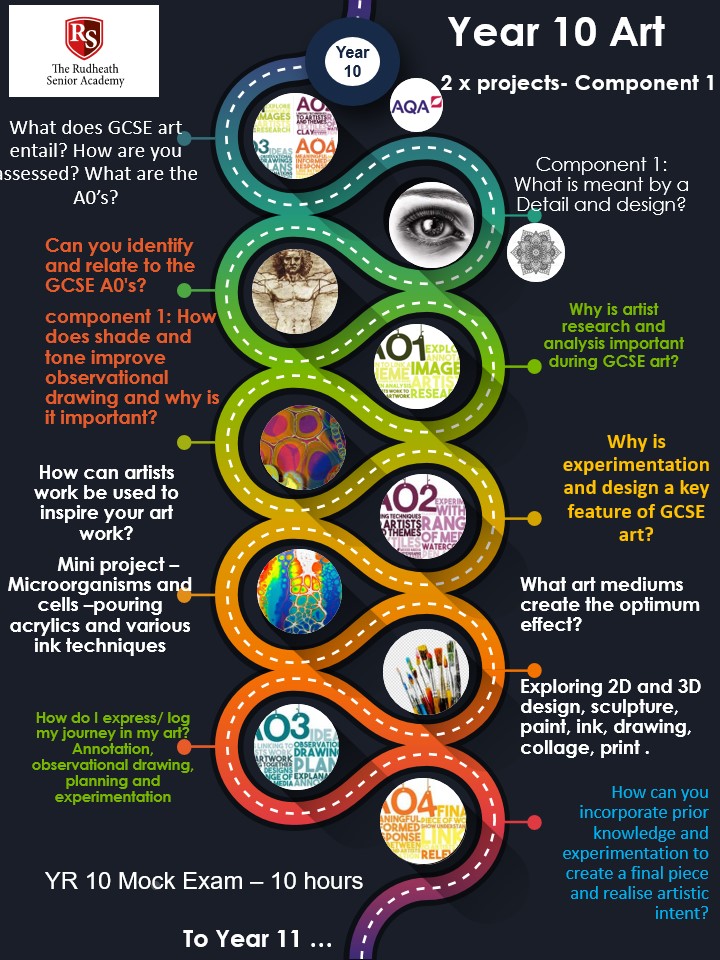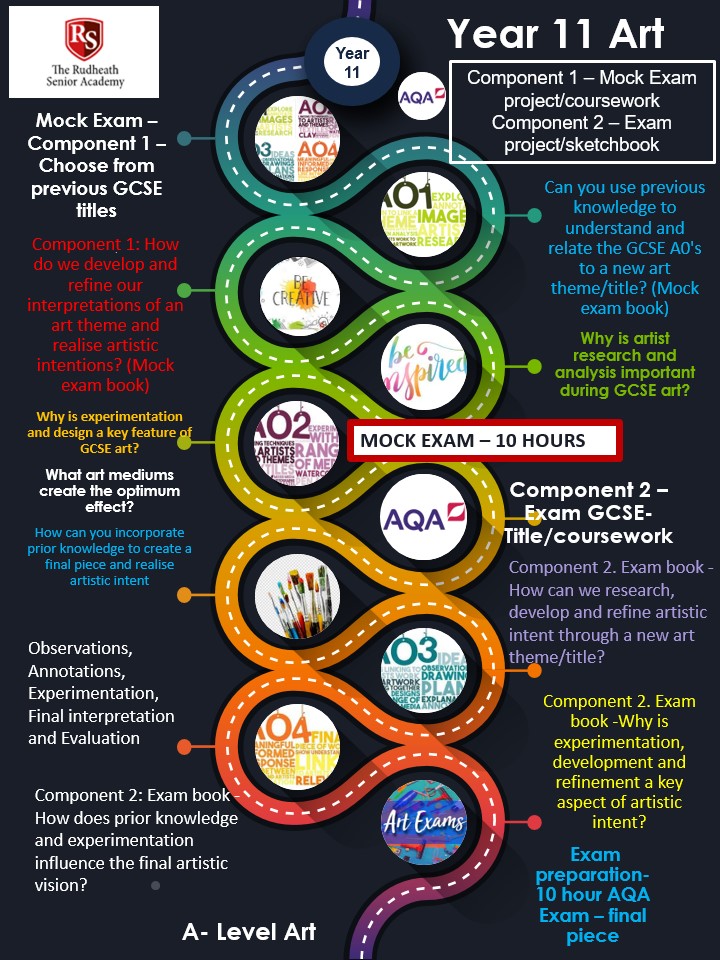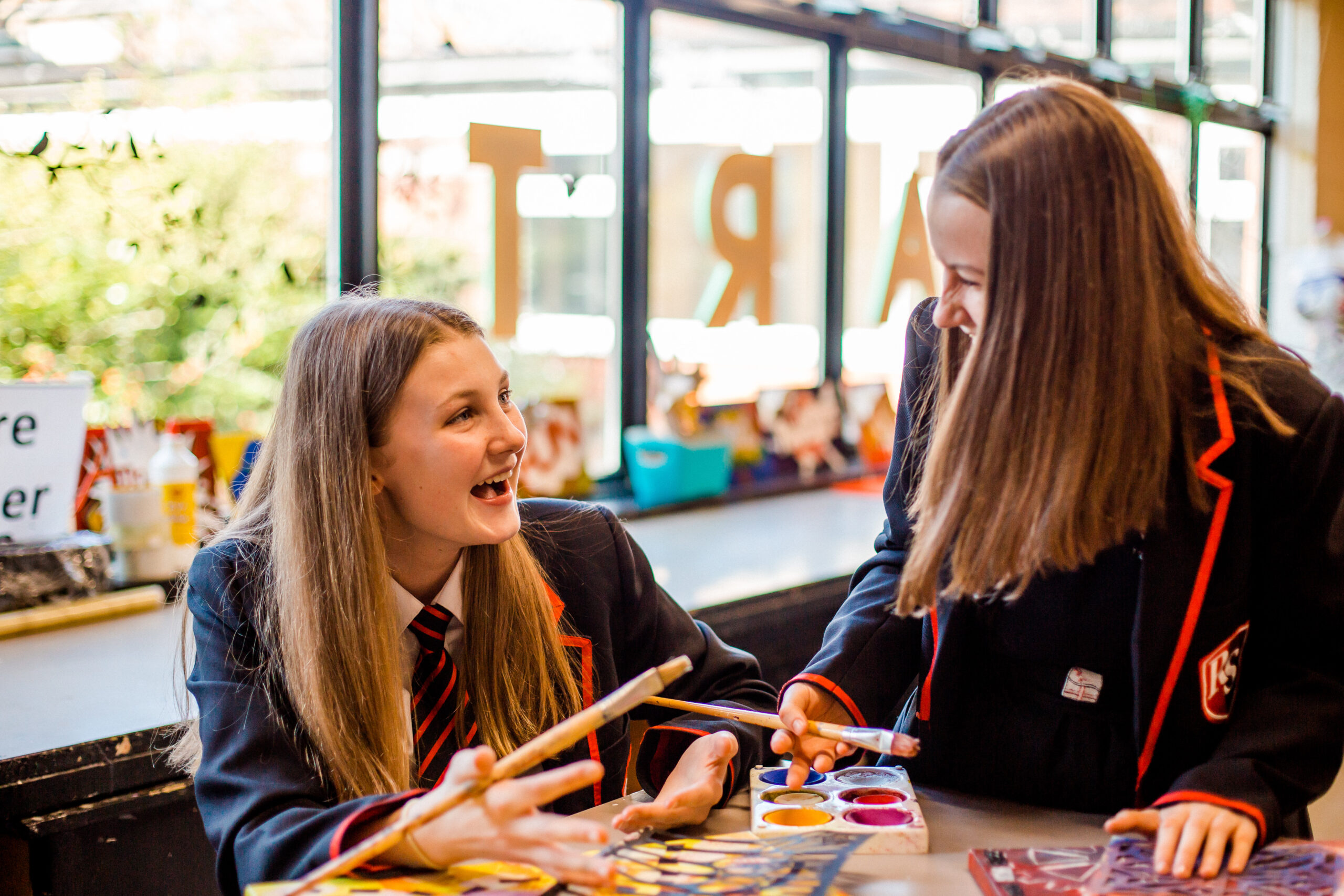
Art and Design
Art at Rudheath Senior Academy is first and foremost a practical subject. At Key Stage 3 students will be encouraged to work in the style of a variety of artists using everything from mythical creatures to everyday objects as their stimuli. As they progress into Key Stage 4, they will be more confidently finding their own individual style and be able to continue to develop this by exploring contemporary artists whose style is similar or interesting to them; working in a range of mediums they will produce their own work culminating in an exhibition of their personal response as their final exam.
A key priority for Art and Design is to open pupils eyes to the world of possibilities around them, by offering a fully inclusive curriculum providing cultural capital opportunities for enrichment and inspiration, to equip learners with the knowledge and skills to become well rounded and educated citizens who have the potential to access A-level and beyond. Topics are specifically designed to enthuse and are inclusive of needs, ability and interest.
There is a clear pathway of carefully built up knowledge and skills throughout KS3 and KS4 which enables pupils to be successful at GCSE and beyond. The sequenced art curriculum ensures Pupils start with using accessible media, learn engaging techniques that start at beginner level moving to more complex mediums and concepts.
At key stage 3, Pupils work in half termly projects. The projects replicate that of a concise GCSE project. Pupils study artists – analyse concepts and replicate work, they develop their own ideas showing influence of artists studied. Within each project Pupils explore a range media, produce written reflections of their journey and have their work assessed through peer/self and teacher feedback forward methods. This project order and method of working is repeated in every project, giving the Pupils the grounding and continuity to refine and revisit each component of project requirements.
In Year 7, 8 and 9 Pupils develop skills learnt in previous year group based around; drawing, shading, painting, blending, print, 3D design and artist research to influence final artwork pieces.
GCSE Content
At GCSE for Art and Design: Fine Art and Art and Design: 3D Design, Pupils must study/complete the following components:
Component 1 (portfolio/coursework)- (60%)
Pupils develop responses to an initial starting point/ Project title, by researching meaning and researching artists that link to the project. They then develop and refine ideas, complete observational drawings and create meaningful experimentation that is inspired by the artists chosen. Responses will include evidence of drawing for different purposes and written annotation.
Finally, Pupils use their knowledge to develop a final response/ piece of art for their project. This can be in any art medium and of any size/quantity.
Component 2 (externally set assignment)- (40%)
Pupils respond to a starting point/ Title of a project provided by AQA. This response provides evidence of the student’s ability to work independently within specified time constraints, realise intentions that are personal and meaningful and explicitly address the requirements of all four assessment objectives.
This involves a series of steps within each lesson that begins with activating prior knowledge and leading to independent practice before ending in structured reflection. These are based on Barak Rosenshine’s Principles of instruction.
- Teacher starts each lesson with a knowledge drill (review of relevant prior knowledge to activate schemata ready to build new knowledge into long term learning)
- Learning question
- Small amounts of new knowledge are presented at a time with the opportunity for students to then practice this new material
- Regular, extensive questioning of all students - cold calling
- Model answers and worked examples are regularly provided where appropriate
- Give students opportunities for extensive, successful, independent practice
- Use formative/summative assessment and feedback-next steps to secure students’ progress
- Reflection of learning question
- Follow Behaviour for Learning protocols
- Use of knowledge organisers
The KS3 curriculum is structured with 1 hour lesson per week incorporating;
- Pupils have their own sketchbook and throughout the year they complete 4 projects being assessed each half term on a level of skill based on A01, A02, A03, A04 strands of assessment and learning. This allows sequences skills and knowledge that prepare pupils for accessing the GCSE course.
- AO1: Develop ideas through investigations, demonstrating critical understanding of sources.
- AO2: Refine work by exploring ideas, selecting and experimenting with appropriate media, materials, techniques and processes.
- AO3: Record ideas, observations and insights relevant to intentions as work progresses.
- AO4: Present a personal and meaningful response that realises intentions and demonstrates understanding of visual language.
The KS4 curriculum is structured with 5 hour lessons per fortnight incorporating; 4 projects over Year 10 and Year 11. (Assessed half termly) Curriculum teaches skills based on A01, A02, A03, A04 strands of assessment and learning.
Each project starts with a baseline assessment in order to assess pupils prior skills. They are also assessed at the end of each assessment to see pupil progression. This is followed by an introduction to the theme and assessment objectives (A01, A02, A03 and A04). Lessons begin with a discussion of prior knowledge and previous lesson recaps and homework is set to enhance Pupils understanding of key skills, vocabulary and artists. Lesson reflections are completed to ensure pupils can evaluate their work and know how to improve it for a follow up lesson.
Enrichment opportunities are embedded into the curriculum, offering learners a broader experience of Art & Design. There are secure links with local schools, partnership schools and the wider community. It is important for learners to experience art competitions, art galleries and working with external artists in order to widen their knowledge and skills.
As a department we are passionate about improving the Art capital of our young people so they are equipped with the knowledge and skills for the next stage of their journey.
We are currently developing an enrichment programme in Art that not only continues our work with STEAM/Creative Art’s ambassadors but also provides a variety of experiences which enrich cultural awareness.
We are also hoping to offer meaningful Art related trips for each year group especially /Art related experience days with leaders in their field coming to share their jobs and experiences with our pupils and external visitors/artists coming to add extra excitement and experience to our subject.


